

2012 Mac Setup for Ruby development. Eric Moritz - Books every self-taught computer scientist should read. There are three books that I believe that every self-taught computer scientist should read. These are books that I often recommend to smart junior developers that learned their knowledge by doing instead of schooling. These are books that will close the gap for people that fall into the category of "or equivalent experience" on a job posting.
6.00 Introduction to Computer Science and Programming, Fall 2008. 6.001 Structure and Interpretation of Computer Programs, Spring 2005. 6.005 Elements of Software Construction, Fall 2008. 6.006 Introduction to Algorithms, Spring 2008. Apprenez à vos associés à coder (un peu) Petite mise en situation: - J’ai vendu une super presta aujourd’hui, ça va être top, mais il va y avoir quelques développements à faire!
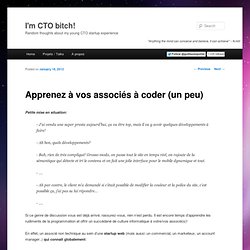
- Ah bon, quels développements? - Bah, rien de très compliqué! Grosso-modo, on passe tout le site en temps réel, on rajoute de la sémantique qui détecte et tri le contenu et on fait une jolie interface pour le mobile dynamique et tout.- ….- Ah par contre, le client m’a demandé si c’était possible de modifier la couleur et la police du site, c’est possible ça, j’ai pas su lui répondre…- …. Si ce genre de discussion vous est déjà arrivé, rassurez-vous, rien n’est perdu. En effet, un associé non technique au sein d’une startup web (mais aussi: un commercial, un marketeux, un account manager..) qui connait globalement: sera capable: D’apprécier ce qui est faisable ou non et pour quel effort en terme de développement, directement en rendez-vous client.
Programming (A Start) - Continuations. OpenClassroom. Full courses.
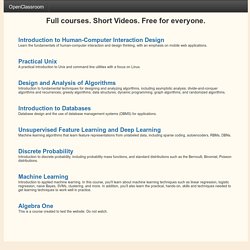
Short Videos. Free for everyone. Learn the fundamentals of human-computer interaction and design thinking, with an emphasis on mobile web applications. A practical introduction to Unix and command line utilities with a focus on Linux. Why Everyone Should Learn to Program. Today we will be reviewing a programming language.
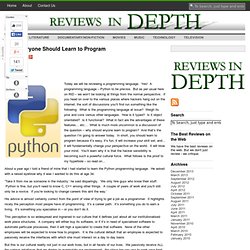
Yes! A programming language – Python to be precise. But as per usual here on RID – we won’t be looking at things from the normal perspective. If you head on over to the various places where hackers hang out on the internet, the sort of discussions you’ll find run something like the following: What is the programming language at issue? Weigh its pros and cons versus other languages. Founders who can't code. An advise to founders who can't code If you are a business/idea guy and looking for a technical co founder, stop.
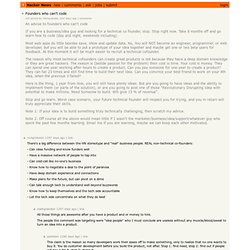
Stop right now. Take 6 months off and go learn how to code (day and night, weekends including). Most web apps do little besides save, show and update data. No, You will NOT become an engineer, programmer, or web developer, but you will be able to put a prototype of your idea together and maybe get one or two beta users for feedback. The reason why most technical cofounders can create great products is not because they have a deep domain knowledge or they are great hackers. Here is the thing, 1 year from now, you will still have plenty ideas.
Stop and go learn. Note 1: If your idea is to build something truly technically challenging, then scratch my advice. Ask HN: I want to learn how to code. Can anyone tell me how to start learning? Greetings, I am a recent college graduate (as of this past May) and I studied chemistry and physics.
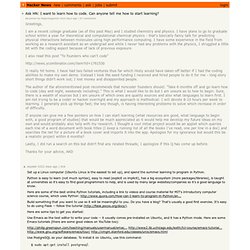
I have plans to go to graduate school within a year for theoretical and computational chemical physics - that's basically fancy talk for predicting physical interactions between molecules using high performance computing. I have some experience in the field from working as a research assistant as an undergrad and while I never had any problems with the physics, I struggled a little bit with the coding aspect because of lack of previous exposure. Code University - Google Code. Programming methodology. Programming abstractions. This course is the natural successor to Programming Methodology and covers such advanced programming topics as recursion, algorithmic analysis, and data abstraction using the C++ programming language, which is similar to both C and Java.
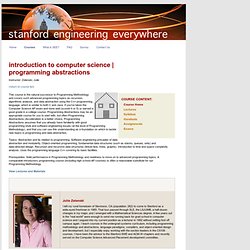
Programming paradigms. Advanced memory management features of C and C++; the differences between imperative and object-oriented paradigms.
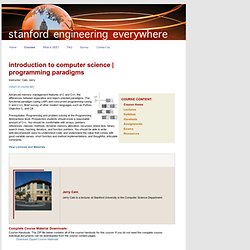
The functional paradigm (using LISP) and concurrent programming (using C and C++). Brief survey of other modern languages such as Python, Objective C, and C#.